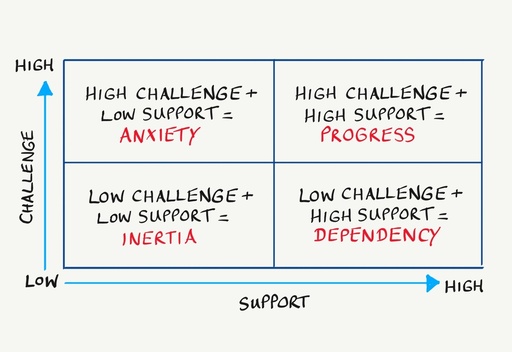The Support-Challenge Matrix was developed by John Blakey and Ian Day and presented in their book, Challenging Coaching. The matrix maps the level of support your supervisor provides against the level of challenge they set for you, and is helpful for thinking about the PhD supervisory relationship.

- High Challenge + Low Support = Anxiety: Maybe it’s too much, too soon. Your supervisor is expecting you to write a literature review when you haven’t even found out where the toilets are. The task feels overwhelming, but you lack the confidence to ask for help. Awash with imposter feelings, this is evidence that you shouldn’t be doing a PhD. This can happen when a supervisor unconsciously adopts the Persecutor role in the Drama Triangle.
- Low Challenge + Low Support = Inertia: Nobody’s pushing you or showing you what’s required. You’ve been left to figure it out for yourself, but there are few clues. As Newton famously explained, you’ll be stuck until an external force is exerted upon you.
- Low Challenge + High Support = Dependency: Although this is a desirable situation in the first month of your PhD, you can’t remain dependent. It’s vital that you become an independent researcher and start solving some tricky problems on your own. A supervisor who encourages dependency might have unconsciously adopted the Rescuer role in the Drama Triangle.
- High Challenge + High Support = Progress: This is the sweet spot! Your supervisor is challenging you to pursue that research problem and to make your own mistakes, but they’ve got your back in case you experience any major issues. Knowing we have a safety net makes us more willing to take those necessary risks.
High Challenge + High Support is a Win-Win, where you get the support you need and your supervisor gets credit for another successful completion. If you feel the balance isn’t quite right in your supervisory relationship, you can use this matrix to initiate a conversation with your supervisor. Yes, it might be an uncomfortable conversation, but it’s the only way to make progress.
This content is adapted from my workshop on Working with Your PhD Supervisor.